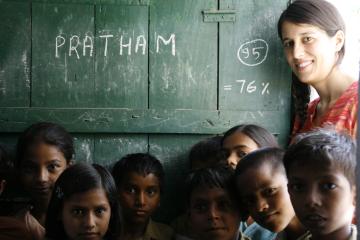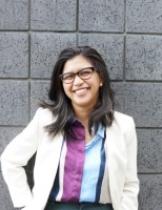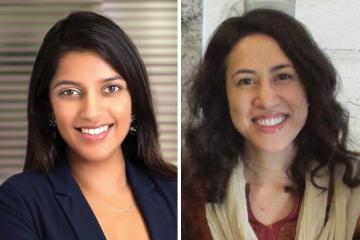
Andrea Adhi, J-PAL ’19, on using interdisciplinary research to support Indonesia’s most vulnerable during Covid-19
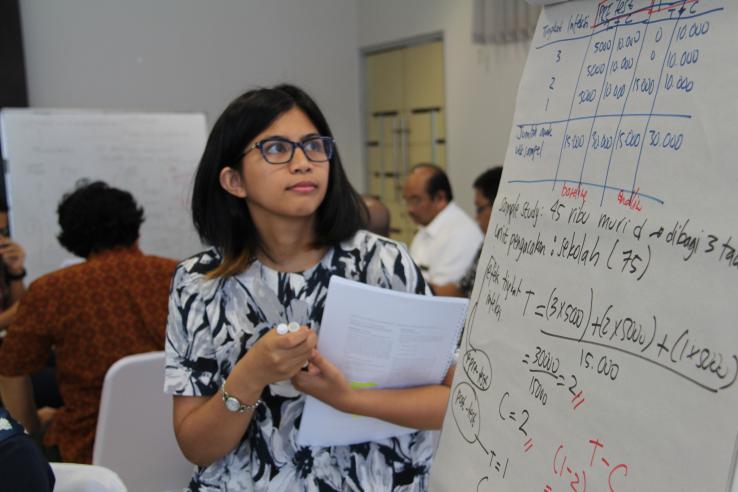
The Alumni Spotlight series highlights J-PAL alumni who are making an impact across industries and around the world. To nominate a J-PAL alum to be featured in a future Alumni Spotlight, please fill out this form.
Andrea Adhi is a former research manager at J-PAL Southeast Asia (SEA), where she managed randomized evaluations on branchless banking, migration, and more. Now at PUSKAPA, the Center on Child Protection and Wellbeing at Universitas Indonesia, Andrea leads their team focused on social inclusion and protection. She discusses how she and her team are working to understand and mitigate the impact of Covid-19 on vulnerable groups in Indonesia, particularly children, and how her experience at J-PAL and TNP2K is informing this work.
How did you come to pursue a career dedicated to improving social policy, and why is research your tool of choice?
I grew up asking questions and wanting to solve social problems, and studying economics was my way to do that. It’s possible that I was also influenced by my parents, both of whom have PhDs, and I acknowledge it’s a privilege to have a support system that embraces curiosity.
In university, I had the opportunity to work as a research assistant on a development project and as an assistant teacher for an econometrics class, which (to my surprise) was an enjoyable experience and taught me that I enjoyed working with data.
Poor Economics [authored by J-PAL co-founders Abhijit Banerjee and Esther Duflo] was also really influential on me—the concept of using small questions to solve big problems inspired me to use research to make an impact in society.
Prior to joining J-PAL, you worked as a data analyst at TNP2K, a Government of Indonesia research and policy agency targeting poverty and frequent research collaborator with J-PAL SEA. What did you learn there that has since shaped your career?
Working there was a valuable experience. TNP2K sits within the Government of Indonesia and uses evidence to ensure policy is more effective. I worked in the monitoring and evaluation unit, and my team supervised and controlled the implementation of poverty reduction programs and activities.
One of the projects I was involved with was PKH, a conditional cash transfer program in Indonesia. I worked on the endline study. It was my first job out of undergrad, and it was an incredible experience to go from learning theory in my econometrics books to working hands-on to evaluate this massive program (since published here).
It wasn’t easy—in addition to helping to conceptualize the study and working with a survey company, we also had to plan far in advance and get buy-in from the government in the form of interest and resources. I also learned that one of the hardest parts is what comes after analysis: advocating for the use of results, such as to continue or discontinue the program, improve some aspects, etc. Researchers need to work hand-in-hand with policymakers to make this happen.
For me, TNP2K was a great introduction to the research industry and sharpened my skills in analyzing data, developing survey instruments, and translating research questions into practice, but I felt I still needed to improve my methodological expertise and grow my network. To that end, I applied for and was gratefully selected as one of the awardees of a fully funded government scholarship for a master's degree in economics at Boston University. I’m hoping to one day pursue a PhD as well.
What are some of the most exciting projects you worked on while you were at J-PAL?
I joined J-PAL as a research associate. My first project was an exploratory study testing types of interventions that have the potential to facilitate collective action and, hence, improve local accountability in the context of village law implementation. This means we were examining the viability of the intervention for a future randomized evaluation, so I worked on the literature review, a series of interviews with stakeholders, and a pilot activity in selected villages.
After that, I got involved in the midline and endline stages of an evaluation of the impact of incentives and transparency on new financial products usage in Indonesia. That study gave valuable lessons in how to strengthen financial inclusion in Indonesia, particularly the branchless banking agent network.
I also helped manage a randomized evaluation assessing the impact of providing information about the quality of migration agencies to potential migrants on welfare and the migration market more broadly. After all, I am thankful to have experienced working on a variety of projects spanning all stages of the process!
To do this work, I needed to learn so many things by doing: project management, time management, resourcefulness, communication with stakeholders from the government to the survey company, attentiveness to detail, and more. It was a blessing to be able to experience field work, as it’s so different in practice from how it is in the literature.
It was also really rewarding to be part of a global network of J-PAL and IPA researchers, many of whom I met in J-PAL/IPA’s joint research staff training in Kenya.
You left J-PAL two years ago to lead PUSKAPA’s social inclusion and protection work. Could you tell us about the organization and your role in it? Can you give us an example of a project you are working on?
PUSKAPA is a think tank at Universitas Indonesia that focuses on child protection and well-being. We are an interdisciplinary team of researchers, policy thinkers, and program implementers who work with government and civil society to create inclusive solutions to ensure that all children have access to social care services, health, education, and justice opportunities.
I lead the social inclusion and protection team that focuses on ensuring children and vulnerable individuals can enjoy access to basic services and be safe from harm. We have several ongoing projects to address the issues. Some of them are generating evidence and advocating on how to improve the lives of children in cities and understanding and improving the child protection and social welfare system. We also work with other civil society organizations in advocating for the implementation of a national strategy to prevent child marriage and violence against children.
When you took over this workstream in late 2019, you could not have known how social protection would become so critically important just months into 2020, when Covid-19 upended Indonesia’s economy. How did the pandemic impact your work, and how did you and your team adapt?
The Covid-19 pandemic has magnified all the challenges we already had, and revealed the importance of child protection and welfare in preventing poverty and childhood violence, which hinder human capital and economic growth.
Policymakers sometimes understand these as separate things and try to address them in silos. As researchers, we need to take into account how problems are related in order to address them, especially during emergencies.
The Government of Indonesia, for example, provided cash transfers to support the poorest households during the pandemic. But since these were targeted to existing beneficiaries of health and education programs, some vulnerable groups, like those without legal identities or children outside traditional households, were left out. PUSKAPA worked with the Government of Indonesia to publish a policy paper on how to prevent and manage the impact of Covid-19 on children and vulnerable individuals.
We’re also concerned about those who live without electricity or proper sanitation or clean water, which have all been really important in the pandemic for accessing virtual education and staying healthy. The pandemic has made all these issues worse, but it’s also an opportunity for us to tackle these problems and make improvements throughout the system.
My team’s day-to-day work ranges from advocacy activities to capacity building to data collection and analysis, all of which have been virtual since early 2020. We’ve been working to understand the experience of children living in cities during the pandemic, particularly vulnerable children who are not typically included in official statistics. Because we want to be respectful of their time and are conscious of Zoom fatigue, we are conducting asynchronous interviews with children over Whatsapp and live chat. This allows them to respond to us over a call, voice note, text, pictures, and so on.
We just published a working paper on considerations for the design and implementation of this digital research project. There’s an opportunity here to make data collection even cheaper, faster, and more accessible, although we are conscious that there are groups that we cannot reach and more needs to be done to achieve inclusive online research.
How do PUSKAPA and J-PAL SEA’s activities align? What do you think the two organizations could learn from each other?
PUSKAPA and J-PAL both generate and use evidence to give recommendations to solve policy challenges, and seek to learn from other research as well as dialogues with policymakers. At PUSKAPA, we believe that we can only improve Indonesia’s human development trajectory by preventing and addressing problems at the intersection of poverty, violence and neglect, and emergencies. As this aligns with J-PAL’s mission, I look forward to opportunities for J-PAL and PUSKAPA to collaborate on potential solutions to children’s issues.
Our scope is more narrow but intersects with other sectors: In the context of children and their families and caregivers, we focus on increasing social inclusion and protection, strengthening the legal identity system, and providing access to justice. These are all interrelated—for example, to access government services, you need a legal identity. But if you are low-income or born in a remote rural area, there may be some barriers to getting a birth certificate.
At PUSKAPA, I’ve learned that advocacy starts from the very beginning of defining a research question. We’ve been undertaking interdisciplinary research and using cross-sectoral approaches to understand the situation and solve problems faced by children and vulnerable populations in Indonesia. It makes me keen to learn other research disciplines beyond economics to get a better understanding of system dynamics, and I think there are opportunities for J-PAL to incorporate more interdisciplinary research as well.
Related Content

Alumni working together: Abhilasha Purwar ‘15 and Amber Luong ‘15 on the need for disruptive innovation to fight climate change
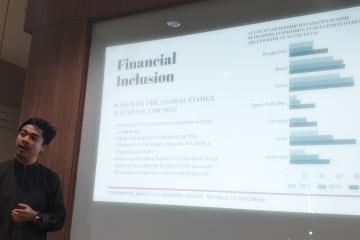
Irwan Setyawan, J-PAL ‘17, on making the jump from research to government in Indonesia
